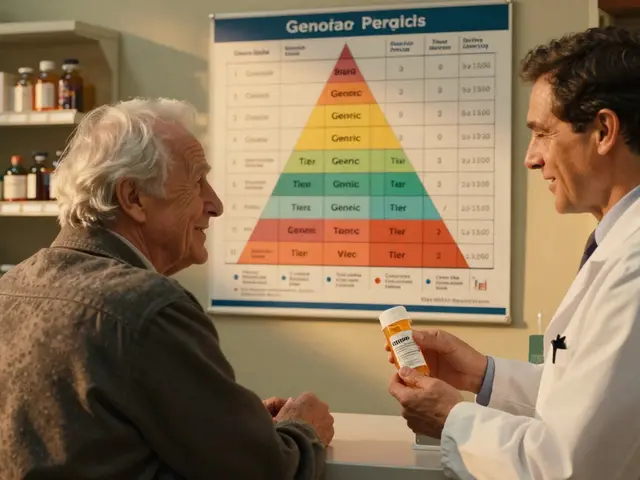Ketoconazole is a go-to medication when it comes to treating pesky fungal infections. But did you know some things can interfere with how it works? Let's talk about what you should steer clear of to get the most out of your treatment.
First up, food and drink. Grapefruit juice might be your breakfast staple, but it's not a friend of ketoconazole. It can increase the medication's levels in your blood, which could lead to some unwanted side effects.
Then, let's chat about medications. Some medicines, when mixed with ketoconazole, can cause more harm than good. For example, certain blood pressure meds and cholesterol medications can have adverse interactions. It's always a good idea to have a heart-to-heart with your doctor about everything you're taking.
- Understanding Ketoconazole
- Food and Drink to Avoid
- Medication Interactions
- Potential Side Effects
- Tips for Safe Use
- When to Consult a Doctor
Understanding Ketoconazole
Alright, let's break it down. Ketoconazole is an antifungal medication that helps clear up those annoying fungal infections. It's been around for a while and can tackle a range of issues, from skin problems like athlete's foot to more serious systemic infections. It's also in shampoos to fight off dandruff. Handy, right?
It works by blocking an enzyme that fungi need to produce their cell membranes. Without this enzyme, the fungi basically can't survive. Bingo, problem solved!
Different Forms
Ketoconazole comes in two main forms – oral and topical. The pills are prescribed for more severe infections, but the cream or shampoo can be used for milder cases, like dandruff or ringworm. Your doctor will decide which form suits your situation best.
How Long Does It Take to Work?
Good question. The timing can vary, but typically, you'll start noticing improvements within a few days to a couple of weeks. Just a heads up: it's crucial to finish the entire course as prescribed, even if symptoms clear up, to make sure those unwelcome fungi don't make a comeback.
If you're on the medication and wondering, "Is there something I shouldn't be doing?" – the answer is yes! That's why understanding potential interactions is key to making your treatment smooth sailing.
Food and Drink to Avoid
When you're on ketoconazole, your diet matters more than you might think. Certain foods and drinks can mess with this medication, and the most notorious culprit? Grapefruit juice.
Why Grapefruit Juice is a No-Go
Grapefruit juice can boost the levels of ketoconazole in your bloodstream. This might sound okay, but too much can lead to heightened side effects, some of which are pretty unpleasant. Keeping it off the menu is a safe bet.
Alcohol and Caffeine: Handle with Care
While a glass of wine or cup of joe now and then usually isn't an issue, large quantities of alcohol and caffeine can sometimes aggravate the side effects of ketoconazole, like dizziness or an upset stomach. Moderation is key here.
Consider Your Meals
Taking ketoconazole with food is generally recommended to help it work better and keep your stomach happy. Simple meals that are light on fats can be more forgiving on your digestive system. Aim for balance and avoid rich, heavy foods that weigh you down.
Fasting and Keto Diets
Fancy a keto or fasting diet while on ketoconazole? You might want to reconsider. These diets can mess with how your body absorbs medications. Always talk to your healthcare provider before tweaking your diet drastically.
| Food or Drink | Interaction Risk |
|---|---|
| Grapefruit Juice | High |
| Alcohol (in excess) | Moderate |
| Caffeine (in excess) | Moderate |
| High-fat Meals | Potential Stomach Discomfort |
Making these adjustments is about ensuring ketoconazole does what it's meant to do. If in doubt, your doc or pharmacist is only a call away. Better safe than sorry, right? Dive into your treatment plan without unnecessary hiccups by keeping these tips in mind.
Medication Interactions
When taking ketoconazole, being aware of potential medication interactions is crucial. Some drugs can clash with ketoconazole, altering how it works or leading to side effects.
Anticoagulants
Are you on blood thinners like warfarin? Ketoconazole can increase their effect, raising the risk of bleeding. Keep tabs with your doctor; they might need to adjust your dosage.
Cholesterol Medications
Some statins, such as atorvastatin and simvastatin, don't mix well with ketoconazole. This combo can bump up the risk of muscle disorders, so double-check with your healthcare provider.
Antacids and Stomach Medications
If you're popping antacids or proton pump inhibitors like omeprazole, they can lower ketoconazole's absorption. Try taking ketoconazole at least two hours before these medications.
Antidepressants
Some antidepressants, particularly SSRIs like fluoxetine, might need a dose adjustment if you're on ketoconazole. Always keep your psychiatrist in the loop.
Quick Recap
- Consult your doctor about every medication you're taking.
- Be alert to any unusual symptoms.
- Regular check-ups can help adjust doses if needed.
Here's a handy reminder: communication with your healthcare provider is key when on ketoconazole and other meds.

Potential Side Effects
When using ketoconazole, it's important to be aware of potential side effects that may pop up. Not everyone will experience these, but it's good to be informed.
Common Side Effects
Some side effects are pretty common and might not be too worrisome. You could experience itching or a burning sensation if you're applying this medication topically. If you're ingesting it, you might get a stomach ache or headache. These are usually manageable and might go away on their own.
Serious Side Effects
This is where you need to pay closer attention. Some serious side effects could mean it's time to consult your healthcare provider. Watch out for signs like shortness of breath, feeling faint, or noticing dark urine. These could indicate liver issues or an allergic reaction, both of which are serious concerns.
Long-Term Use Concerns
Using ketoconazole long-term, especially at high doses, might impact your adrenal glands, which could lead to hormone imbalances. It's crucial to stick to your doctor's recommended dose and duration to avoid these complications.
Side Effect Statistics
| Side Effect | Occurrence Rate |
|---|---|
| Stomach Ache | Up to 10% |
| Headache | Up to 10% |
| Severe Allergic Reaction | Less than 1% |
Always talk to your doctor or pharmacist if you're concerned about these effects while using ketoconazole. They can help you weigh the benefits against the risks and adjust your treatment if needed.
Tips for Safe Use
Using ketoconazole effectively without any hiccups involves a few practical steps. Staying informed is half the battle, but putting the info into action seals the deal.
Stick to the Prescribed Dose
Sounds simple, but it's crucial. Only take the amount your doctor prescribed, as your specific needs could vary. More is not better here, especially since ketoconazole can have strong effects when misused.
Consistency is Key
Make ketoconazole part of your routine. Take it at the same time daily if you're using it long-term. This helps your body get used to the medication and work with it effectively.
Watch What You Eat and Drink
Avoid grapefruit products. Even if it's just a slice for breakfast or juice, it messes with how ketoconazole is absorbed. Stick to foods that you know won't trigger interactions.
Communication with Your Doctor
Keep the lines of communication open with your healthcare provider. If you're taking other medications, be upfront about it so they can provide the best advice for your situation.
Be Aware of Side Effects
Know what to look out for, like changes in liver function or unusual reactions. If something feels off, see your doctor—better safe than sorry.
Adherence to Treatment Duration
Finish the entire course even if you start feeling better. Failing to do so might lead to the infection popping back up, which nobody wants.
Following these tips can help you dodge unwanted situations and make your ketoconazole treatment a breeze. Stay informed and stay healthy!
When to Consult a Doctor
Using ketoconazole brings with it the responsibility to stay alert to any unusual changes. But how do you know when it's time to hit up your doctor for a chat? Let’s break it down.
Unusual Side Effects
First, if you experience anything unexpected like severe nausea, vomiting, or dizziness, it's time to pick up the phone. These aren't your regular side effects and can indicate something more serious.
Persistent Symptoms
Next, if you're sticking to your medication schedule and eating all the right things, but your infection just won’t budge, it’s worth checking in. Sometimes, the fungus can be stubborn, and you may need a different approach.
Allergic Reactions
Watch out for signs of an allergic reaction such as rash, itching, or swelling, especially on the face, tongue, or throat. Difficulty breathing also falls under this category and requires immediate medical attention.
Severe Drug Interactions
You've been warned about interactions, but if you accidentally mix ketoconazole with meds you've been told to avoid, and you're feeling off, seek professional advice. Your health isn’t something to gamble with.
Routine Check-Up
Even without visible issues, a routine check-up can be beneficial if you're on long-term ketoconazole, especially to monitor liver function, as the medication can put some stress on it.
Stay proactive about your health. It’s better to reach out sooner rather than later, even if it’s just for peace of mind.






Comments
luemba leonardo brás kali
22/Mar/2025When it comes to drug interactions, the cytochrome P450 enzymes are the main gatekeepers of metabolism.
Ketoconazole is a strong inhibitor of CYP3A4, which means it can raise plasma levels of many co‑administered drugs.
This effect is especially pronounced with medications that have a narrow therapeutic window, such as certain anti‑arrhythmics and immunosuppressants.
Grapefruit juice contains furanocoumarins that also block CYP3A4, creating a double‑whammy when taken with ketone‑azole.
The result can be an unexpected spike in drug concentration, leading to toxicity or severe side effects.
For patients on warfarin, even a modest increase in its levels can tip the balance toward dangerous bleeding.
Likewise, statins like simvastatin may cause muscle damage if their clearance is reduced by ketoconazole.
Proton pump inhibitors, on the other hand, can lower the absorption of ketoconazole itself, making the antifungal less effective.
That is why clinicians often advise spacing the dosing of antacids by at least two hours from the antifungal.
Lifestyle factors matter too; heavy alcohol consumption can exacerbate liver strain already imposed by the drug.
Caffeine in excess may amplify nervous system side effects such as dizziness or jitteriness.
Patients following a ketogenic or fasting regimen should be aware that rapid changes in gut motility can alter drug bioavailability.
Monitoring liver function tests during prolonged therapy is a prudent safety measure.
If you notice dark urine, unexplained fatigue, or severe nausea, contact your health provider promptly.
Ultimately, a clear medication list and open dialogue with your prescriber are the safest ways to prevent harmful interactions.
Corey McGhie
22/Mar/2025Looks like someone forgot to tell the grapefruit its day job is ruining meds.
Mixing that sweet juice with ketoconazole is basically inviting a party where everyone gets way too drunk.
And don’t even get me started on those “just a sip” antidepressants that suddenly feel like a roller coaster.
Bottom line: keep the breakfast menu simple, or your stomach will write a protest letter.
Stay safe, stay savvy.
Ajayi samson
22/Mar/2025Seriously, people think they can just pop a pill and ignore the whole interaction list.
If you’re on blood thinners and start messing with ketoconazole, you’re basically signing up for a horror show.
Don’t be that guy who learns the hard way about liver enzymes.
Read the label, talk to a doc, stop acting like a lab rat.
Lief Larson
22/Mar/2025ketoconazole is a strong drug avoid grapefruit and big fats also watch out for alcohol it can mess with your stomach and liver so be careful
Julia Grace
22/Mar/2025just a heads up dont mix grapefruit jus with ketoconazole its a bad combo you might feel queasy or worse if you take it with alot of cow mil you could get a stomach ache its best to keep it simple yeah
Sadie Bell
22/Mar/2025Hey folks, just a quick reminder: if you’re on ketoconazole, try not to overdo the coffee or the wine.
I know we all love a good latte, but moderation keeps the side‑effects in check.
Stay tuned to how you feel and don’t hesitate to call your doctor if anything seems off.
Noah Bentley
22/Mar/2025Alright, let’s get real – you don’t need to be a chemistry professor to know that grapefruit and ketoconazole don’t mix.
If you’re still sipping that stuff, you’re basically playing Russian roulette with your liver.
And those “just a little” antacids? Yeah, they’ll make the drug disappear faster than my Wi‑Fi on a bad day.
Bottom line: read the warnings, don’t be an idiot.
Kathryn Jabek
22/Mar/2025It is incumbent upon every patient to diligently consult their prescribing physician prior to the concurrent administration of any pharmacologic agents possessing a recognized propensity for cytochrome P450 inhibition.
Failure to observe such prudence may culminate in iatrogenic complications of considerable severity.
Therefore, a comprehensive medication reconciliation is not merely advisable but imperative.
Ogah John
22/Mar/2025True that, Noah – the grapefruit thing is basically a textbook example of a food‑drug interaction.
What I find useful is setting a reminder to take ketoconazole at least two hours before any antacids; that little habit saves a lot of hassle.
Also, keeping a written list of all meds helps the pharmacist catch any hidden clashes.
Kelvin Murigi
22/Mar/2025Ajayi, you raise a valid point about warfarin; the increased bleed risk is a serious concern.
In practice, clinicians often order more frequent INR checks when ketoconazole is introduced.
It’s also wise to monitor liver enzymes regularly, especially if the therapy extends beyond a few weeks.
ahmad matt
22/Mar/2025Grapefruit and ketoconazole? Bad idea.